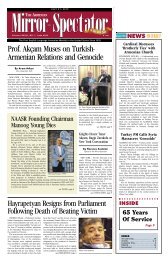Inspirational Vergin Mazmanian, 103, Dies Bipartisan Genocide ...
Inspirational Vergin Mazmanian, 103, Dies Bipartisan Genocide ...
Inspirational Vergin Mazmanian, 103, Dies Bipartisan Genocide ...
You also want an ePaper? Increase the reach of your titles
YUMPU automatically turns print PDFs into web optimized ePapers that Google loves.
Daylight Is Bright and Bold<br />
IItt IIss DDaayylliigghhtt By Arda Collins<br />
Yale University Press, 2009<br />
By Michael Casey<br />
Arda Collins’ It Is Daylight is the <strong>103</strong>rd winning<br />
volume in the Yale Younger Poet Series.<br />
The series publishes one first book of poetry<br />
every year. Of<br />
course, poetry is<br />
not a big deal in<br />
Book Review American publishing,<br />
but if one has<br />
a first book manuscript of poems, this Yale<br />
Series is the best place to try.<br />
Truth be told, the series has been man-centric.<br />
Although superb collections by female poets,<br />
Jean Valentine and Adrienne Rich, have<br />
appeared, the series mostly has male poets selected<br />
by male editors. Sylvia Plath, a premier<br />
American poet, submitted manuscripts twice to<br />
the competition without any luck. All this<br />
changed with the tenure of editor Stanley<br />
Kunitz, renowned as a poet and as a nice man.<br />
His selections included books by Carolyn Forche<br />
and by Olga Broumas. The current judge is<br />
Louise Gluck, a wonderful poet, and in like manner,<br />
just as talented as an editor. Collins’ book,<br />
selected by Gluck, is an achievement.<br />
S A T U R D A Y, J U N E 2 5 , 2 0 1 1 T H E A R M E N I A N M I R R O R - S P E C TAT O R 17<br />
Collins’ use of idiom is superb, subtle and<br />
incisive. The poems in the second person are so<br />
completely bright and innovative and in her<br />
hand inimitable. She takes delight in everyday<br />
things: grocery stores, the human hand, salt<br />
and pepper shakers, dentists, etc.<br />
The elegy for her great-aunt I found profoundly<br />
moving. It addresses generational conflict,<br />
the <strong>Genocide</strong>, cultural ethnic differences,<br />
religion, life, death and hope:<br />
…I saw her a number of times,<br />
starting in the predictable moss-covered<br />
stone chambers and ending on an astringent<br />
deck of a ship<br />
heading for probably<br />
a Greek island with one olive tree on it,<br />
I felt an urgent question forming.<br />
I didn’t know what it was though.<br />
It came to me though: Is it better to be alive<br />
or dead?<br />
She said “It’s better alive.”<br />
This is a very important poem to read for all<br />
Armenians and worth the price of the book on<br />
its own. It is a triumph. As an Ordutzi would<br />
say, “Mazeltov!”<br />
With the interest these days in total disclosure,<br />
I must say that I believe that Collins and I<br />
have some of the same ancestors in the city of<br />
Ordu on the Black Sea. Still, I affirm that I am<br />
pleased to objectively review her first book of<br />
poems, It Is Daylight.<br />
Adam Hochschild’s To End All Wars Shows resistance<br />
to World War I, Its ‘Needless Folly and Madness’<br />
By Karen R. Long<br />
Reading the indispensable Adam Hochschild’s<br />
latest book of history, To End All Wars, puts the<br />
reader in mind of the playground.<br />
In this charged, lucid account of the First<br />
World War, we watch generals and politicians<br />
avail themselves of techniques common to any<br />
middle-school brawl: catcalls, face-saving, paeans<br />
to honor, appeals to manliness, cries to God and<br />
gleeful maneuvering so as to be able to say, “He<br />
started it.”<br />
Celebrities stoke the hostilities, like boys circling<br />
the fray. Thomas Mann, Germany’s greatest<br />
living writer, declared the coming war meant<br />
“purification, liberation” from the “toxic comfort<br />
of peace.” Just as bellicose was Rudyard Kipling,<br />
whose writing characterized the nasty British<br />
aggression in the Boer War as a foretaste, “a firstclass<br />
dress-parade for Armageddon.”<br />
Nearly a century after World War I, it remains<br />
difficult to grasp its “needless folly and madness,”<br />
as Hochschild puts it. He has a way with telling<br />
detail, including this one: “If the British dead<br />
alone were to rise up and march 24 hours a day<br />
past a given spot, four abreast, it would take them<br />
more than two and a half days.”<br />
And still, the civilian toll — an estimated 12 million<br />
to 13 million dead — was higher than the military’s.<br />
The war brought famine and the Armenian<br />
<strong>Genocide</strong>. Hochschild, in his subdued, signature<br />
way, also notes what few governments bothered to<br />
count: the deaths of 400,000 underfed, whipped<br />
African porters along the Western front.<br />
He begins by walking the northern French<br />
countryside, reading visitor’s logs and plaques in<br />
hundreds of cemeteries. The farmland is still<br />
gouged and pitted. Here, the gunners’ ears bled<br />
from the concussive noise. And here, on the edge<br />
of and into a new millennium, passers-by still trigger<br />
unexploded shells — 31 such deaths in 1991<br />
alone.<br />
Hochschild has written two classic books: King<br />
Leopold’s Ghost, about forced labor and murder<br />
in the Congo; and Bury the Chains, about<br />
England shedding its slave trade. A founder of<br />
Mother Jones magazine, he has long been a keen<br />
and eloquent student of how cultural consensus<br />
is reached, resisted and remade.<br />
It helps that his writing is as clear and stirring<br />
as a church bell. Hochschild describes the obstinate<br />
prosecution of Europe’s first industrial war<br />
and the patchy resistance to that conflict, mostly<br />
in England, where some 20,000 men defied the<br />
draft. Roughly 6,000 conscientious objectors<br />
went to prison; some were executed.<br />
Fifty were handcuffed, transported to France<br />
and informed, a few days before the Battle of the<br />
Somme, they would be executed if they refused to<br />
fight.<br />
“In an act of great collective courage . . . not a<br />
single man wavered,” Hochschild writes. “Only at<br />
the last minute, thanks to frantic lobbying in<br />
London, were their lives saved. These resisters<br />
and their comrades did not come close to stopping<br />
the war, and have won no place in the standard<br />
history books, but their strength of conviction<br />
remains one of the glories of a dark time.”<br />
Hochschild follows the stories of a handful of<br />
such individuals, including the crusading<br />
Charlotte Despard, whose own brother commanded<br />
the British forces in Europe, and Albert<br />
Rochester, a railway signalman court-marshaled<br />
for the temerity of questioning why every English<br />
officer kept a personal servant to polish his boots.<br />
At trial, he was as withering as the era’s most<br />
celebrated resister, Bertrand Russell.<br />
“This war is trivial, for all its vastness,” wrote<br />
the mathematician, who was also prosecuted and<br />
jailed. “No great principle is at stake, no great<br />
human purpose is involved on either side. . . . The<br />
English and French say they are fighting in<br />
defence of democracy, but they do not wish their<br />
words to be heard in Petrograd or Calcutta.”<br />
Questions of patriotism and morality sting<br />
along these pages, which chronicle the lethal<br />
advent of chlorine gas and tanks, and German<br />
women so hungry they tear apart a faltering<br />
horse. Kipling, we learn, rushed his only son into<br />
uniform at age 17, pulling strings to have the<br />
boy’s myopia overlooked.<br />
A shell fragment in Belgium shattered John<br />
Kipling’s mouth. He was last seen crying in pain;<br />
his body was never found. No one dared tell his<br />
formidable father, who imagined his son’s last act<br />
as laughing at some soldierly jest. Still, when an<br />
American friend came to visit the imperialist poet,<br />
he squeezed her hand hard and said, “Down on<br />
your knees, Julia, and thank God you haven’t a<br />
son.”<br />
Such scenes cut us and underscore Hochschild’s<br />
fairness and empathy. Many books about World<br />
War I crowd the shelves; more will arrive to mark<br />
its centennial in three years. Here is one to give<br />
pause as the United States tries to discern its own<br />
purpose in three separate conflicts.<br />
Idealists all around fought in and resisted the<br />
Great War, and, as Hochschild shows, all that sacrifice,<br />
all those rivers of blood, changed the world<br />
for the worse.<br />
(Karen Long is the book editor of the<br />
Cleveland Plain Dealer.)<br />
ARTS & LIVING<br />
Saints<br />
Vartanantz’<br />
Picnic<br />
By Michael Casey<br />
my uncle Mugarditch was<br />
at Saints Vartanantz’ picnic<br />
And who should be there<br />
but Grandma Yeranoohy’s buddy<br />
Mrs. Sebanjian<br />
some family history…<br />
I have two Armenian uncles<br />
Uncle Vasken and Uncle Mugarditch<br />
bother barbers sapritchned eheen<br />
And Vasken was very very portly<br />
both of them really hot tickets<br />
both them went to BC<br />
barbers’ college<br />
and did you hear<br />
about the low calorie hair tonic<br />
for fatheads??<br />
Mugarditch Mugarditch sapritch eh<br />
Mugarditch Mugarditch<br />
son of a gun<br />
well Vasken moved to California<br />
but Mugarditch was still in Massachusetts<br />
and had gained some girth<br />
and now back to the picnic<br />
Mrs. Sebanjian sees Mugarditch<br />
and right away walks over to give him<br />
a great big kiss and hug<br />
and a How You, Vasken?<br />
I’m fine, Mrs. Sebanjian<br />
but I’m not Vasken<br />
I’m Mugardtich Midgie<br />
and Mrs. Sebanjian<br />
is really hip<br />
knows that Vasken is a card<br />
Vasken, you yamman<br />
ter tombelig es<br />
you full fun<br />
you karpes eem<br />
you make joke eem vra<br />
and walks away laughing<br />
waving her finger at Vasken<br />
(To reach Michael Casey, contact<br />
mike.casey1@verizon.net.)














